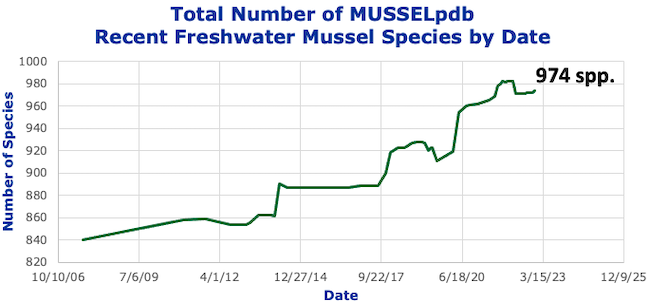| Page last updated
2 December 2022 |
Mussel of the Month
The December 2022 Mussel of the Month is Mulleria rivoli. Mulleria is a monotypic genus endemic to the Rio Magdalena in South America.
This species was our Mussel of the Month back in 2015, but at that time we — and almost everyone else — called it Acostaea rivoli. However, we have recently dug into the issue and have become convinced that Mulleria is probably the correct genus name.
Férussac (1824) first introduced the name Mulleria and provided a description. However, he did not name the specimen that he had before him or provide a definitive locality. Erroneously, he assumed that it must have come from Africa or Madagascar since it looked so much like Etheria.
The type species was fixed by subsequent monotypy by Deshayes (1827) when he applied the name Mulleria rivoli to the specimen to which Férussac was referring in the Rivoli collection (ICZN Art. 69.3). Isaac Lea (1851) also gave a name for the Férussac specimen (Mulleria ferussacii), and various English authors called that same specimen Mulleria lobata (Gray, 1847 [as a nude name]; H. & A. Adams, 1857; Woodward, 1871).
More than two decades later, d’Orbigny (1851) described Acostaea guaduasana from the Rio Magdalena in Colombia. Everybody at the time —including Lea, the Adams brothers, and Woodward — recognized that Acostaea was a junior synonym of Mulleria. Since then, there has been no disagreement about this fact, the consensus has been that there is only a single species, and M. rivoli is the senior synonym.
So, then why has this species been called Acostaea rivoli in all the modern literature, including as a previous Mussel of the Month and in our own global checklist (Graf & Cummings, 2021)? Because Thiele (1934) claimed that Mulleria Ferussac, 1824 was a junior homonym of (and thus preoccupied by) Mülleria Leach, 1814, a nominal genus of amphipod crustaceans. However, ICZN Art. 32.5.2.1 says that ü automatically becomes a ue, and so Mulleria Ferussac, 1824 has no beef with Muelleria Leach, 1814.
While we are personally much attached to Acostaea d’Orbigny, 1851, it sure seems like Mulleria rivolii is the correct name for this freshwater mussel. |
|
Classification:
Phylum Mollusca
Class Bivalvia
Subclass Palaeoheterodonta
Order Unionoida
Superfamily ETHERIOIDEA Deshayes, 1830
Family ETHERIIDAE s.s.
Genus Mulleria Férussac, 1824
Species Mulleria rivoli Deshayes, 1827 |
To find out more about Mulleria and the saga of Acostaea, check out:
- Adams, H., & A. Adams. 1858. The genera of recent Mollusca; arranged according to their organization. John van Vorst, Paternoster Row, London Vol II. 661 pp.
- Deshayes, G.P. 1827. Dictionnaire Classique d’Histoire Naturelle. Volume 11. Rey et Garvier, Baudouin Frères, Paris. 615 pp.
- Férussac. 1824. Sur un nouveau genre de la famille des Huîtres, qui parait réellement vivre dans l’eau douce. Mémoires de la Société d'Histoire Naturelle (2nd series) 1: 366-372.
- Graf, D.L. & K.S. Cummings. 2021. A 'big data' approach to global freshwater mussel diversity (Bivalvia: Unionoida), with an updated checklist of genera and species. Journal of Molluscan Studies 87(1). eyaa034 (36 pp.).
- Gray, J.E. 1847. A list of the genera of Recent Mollusca, their synonyma and types. Proceedings of the Zoological Society of London 15: 129-219.
- Lea, I. 1851. On the genus Acostaea of dOrbigny, a new fresh water mollusk of the order Dimyaria, from the river Guadua, New Granada. Proceedings of the Academy of Natural Sciences of Philadelphia 11: 277.
- d’Orbigny, A. 1851. Revue et Magasin de Zoologie (sér. 2) 3: 60.
- Thiele, J. 1934. Handbuch der systematischen Weichtierkunde. Teil 3. Scapopoda; Bivalvia; Cephalopoda. Additions and corrections for Teile 1-2 and Index for Tiel 3. 3:779-1022.
- Woodward, S.P. 1871. Manual of the Mollusca: A Treatise on Recent and Fossil Shells (2nd ed.). Virtue Brothers & Co., London. 542 pp.

|